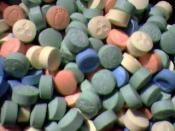What do you think when you hear the word ecstasy? Some people think of the emotion that is referred to in literature and sometimes in casual conversation. Others think about the rave drug that causes them to feel a wide range of emotions Originally, according to the Merriam-Webster Dictionary, ecstasy denoted a trancelike condition marked by loss of rationality and a state of overwhelming emotion. Now it has come to mean intense delight. Strangely enough, someone decided that this would be a good name for an illegal drug. Merriam-Webster defines Ecstasy, the drug, as "a synthetic amphetamine analogue C11H15NO2 used illicitly for its mood-enhancing and hallucinogenic properties" Any overwhelming emotion, such as joy, fear, rage, and adoration, may be refered to as ecstasy. MDMA, or Ecstasy, got its nickname due to the emotions that are associated with it. It can also be called E, X, or Adam. Ecstasy is a drug that, although illegal, has both positive and negative effects on its users.
MDMA, or 'Ecstasy', is a drug that has become very common in the past decade because of its ability to create strong emotions in its users. It is most often found in a tablet form, althought it can also be found as powder or in capsules. When taken, ecstasy is taken orally and rarely ever snorted through the nose. MDMA was created by Merck pharmaceuticals in Germany in 1912 and patented in 1914. People offer two explanations as to why the drug was developed. One theory is that its creators felt it could be an intermediary substance that might be used to help develop more advanced therapeutic drugs. The other theory is that is was used as an appetite suppressant until the negative side effects became obvious. In either case, Merck let the patent run...



Rating
nice paper. very true and good stance on the subject. Effective use of both literal and connotative associations with the word. Good description as well.
5 out of 5 people found this comment useful.